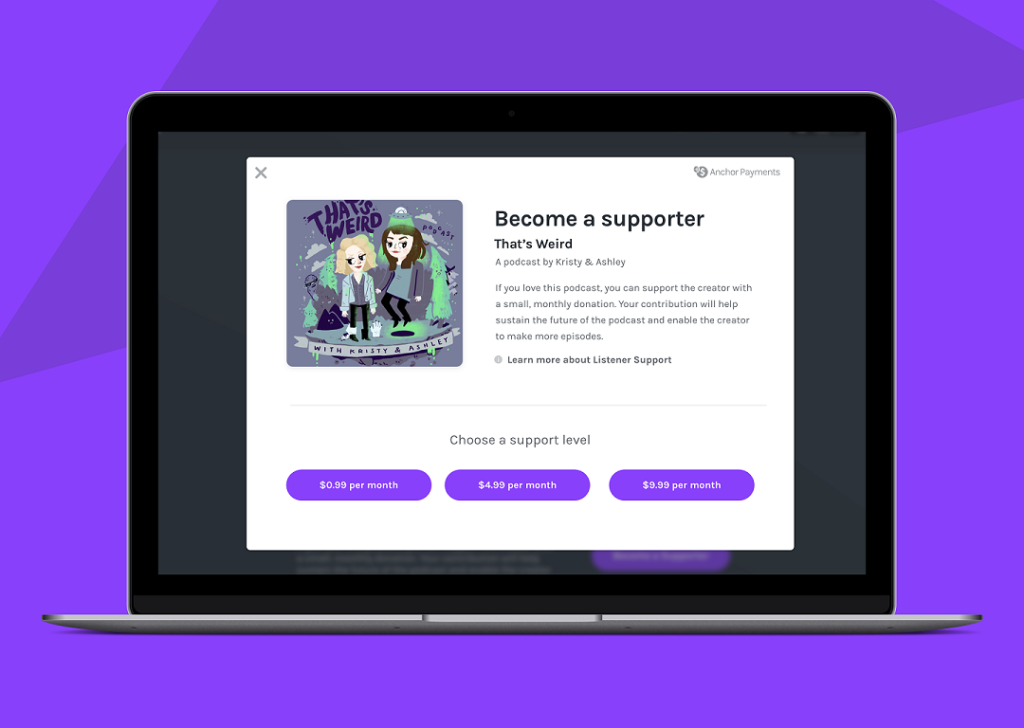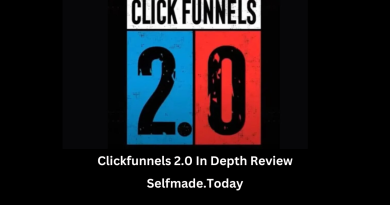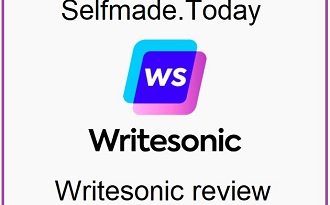Podcast Monetization Options: How to Make Money From Your Podcast
Last Updated on April 7, 2024

Are you a podcast host aspiring to make a career out of your craft?
Are you wondering how you can make money doing podcasts?
Well, you’ll be glad to hear that podcasts can be pretty lucrative if you know how to monetize your content properly.
If you’re not quite sure where to start with podcast monetization, we’ve got you covered. We’ll give you the rundown of how much you can expect to make, the different ways to make money doing podcasts, and which option is best for you.
Keep reading to learn everything you need to know in this guide on monetizing podcasts.
How much money do podcast hosts make
Answering this question can be a bit tricky since the values vary so greatly.
Assuming that you’re just starting out in the field, you probably won’t be making millions like top podcasters such as Joe Rogan and Bill Simmons.
Even so, you can still make a pretty penny if you know what you’re doing.
The median salary for a wage podcaster falls between $55k and $80k a year ($30 – $44 an hour). That, of course, is based on full-time workers and not freelance podcasts.
When we talk about freelance podcasts, the numbers can change a lot.
Sponsorships usually fall in between the $10 and $60 cost per mille (CPM), or cost per 1000 viewers. Depending on how big your podcast is, you’ll probably be making a few hundred dollars per month for mid to low-viewed streams.
As you gain traction and your numbers start to go in, you’ll eventually see these numbers move to the thousands.
Also, the bigger you get, the more you’ll make from donations, patrons, and any merch you sell. Basically, the curve of your income will likely start well below any salary you’d get, but you’ll also have a much greater potential for growth.
With proper growth management and optimization, you can go from making hundreds a month to making thousands a week.
What Are the Different Ways to Monetize Your Podcast?
We’ve already mentioned a few ways to make money podcasting. Now, we’ll go more in-depth into these options and bring up some alternatives.
Sponsorships

The primary source of income for most podcast hosts is sponsorships.
Sponsorships are the endorsement of a product, service, or organization by an influential individual in exchange for monetary gain.
In the case of podcasts, they’re usually a verbal advertisement that starts with something like “this show is brought to you by [blank], the [product slogan].”
The type of sponsorship you get will usually relate to the kind of content you put out.
For example, if your podcast is about video games, you might get sponsored by a mobile game. If you’re a podcast about fitness, you can expect to be sponsored by some sort of supplement or a piece of workout equipment.
So you may be wondering how you “acquire” a sponsorship.
Well, podcasts that get decent views and ratings usually get scouted by potential sponsors.
Businesses will reach out to podcasters who fit their company image for advertising whatever product or service they are selling.
The typical podcast host will embed an ad at the beginning of their stream, a midroll ad, and one at the end of their stream. This is the best method to capitalize on sponsorships without overloading your podcasts with ads.
Benefits
- High potential for profit
- Sponsors that are tailored toward your audience
- Easy to implement
- Little risk involved
Drawbacks
- Contingent on getting a sponsor
- Low starting profits
- Bad for podcasts just starting up
Donations

Another way many podcasters make money is through taking donations from their fans.
Building a loyal fanbase is essential in more ways than one. First of all, it is crucial for growth. You’ll want those there at the beginning with you towards the end as well.
Secondly, if you put in the work and your fans genuinely enjoy your content, some will be happy to support you by donating money.
There are a few ways you can set yourself up to receive donations. You can start a Patreon page that gives details about who you are and what type of message you’re trying to send.
You can also add Paypal or Cash App links to your podcast site, which users can follow and donate. Some podcast streaming services even have built-in donation mechanics that makes sending money quick and easy.
When asking viewers for donations, be gratuitous and don’t be forceful. People will only donate if you give them a reason to.
Benefits
- Free profit
- Based on fan loyalty
- Good for new podcasts
Drawbacks
- Unreliable
- It doesn’t make as much compared to other options
Merchandise
Merchandising your podcast is the next step of development once you start getting a more considerable following and a higher income.
It’s a step up from taking fan donations because you’re actually giving something back in exchange for viewer support.
The kind of mech a podcast will sell usually falls under simple products like clothing, mugs, and accessories but can be more complex to accommodate the type of podcast you have.
This could be something like a line of seasonings, a fitness program, or a guidebook.
In recent years, society has made significant advances in the way of e-commerce, and that has made manufacturing and selling products via the internet extremely easy.
The first step in the merchandising process is finding a manufacturer or an affiliate network like shareasle.
If you are selling something as simple as t-shirts and mugs, then finding a service will be pretty easy since they’re widely available. Some of these services may even help with vending your product.
If you’re trying to sell other types of merchandise, you’ll have to find a specialty service or manufacturer. If it’s something like an e-book, Amazon has an excellent self-publishing service.
Of course, if you’re trying to produce and sell an item like bed frames, you’re going to have a more challenging time. Keep in mind your budget, the demand for your product, and the practicality.
Creating an online shop is also pretty simple. You can use a service like Shopify to create a shop webpage if you already have a manufacturer.
Most vendor services have shipping, handling, and payment options included as well. Be sure to utilize and take advantage of these options.
Benefits
- Great way to promote your brand/image
- Medium-high profit potential
- Has the potential to branch out into a bigger business
- Suitable for streams with more extensive fan bases
Drawbacks
- Can be costly
- Won’t always sell everything
- Risk involved
Online Courses
Podcasts that have an educational spin may find it profitable to create online courses.
If you know what you’re talking about and have a large enough following, then creating an online course where you teach others about your craft is a great addition to your podcast.
Cooking, fitness, academic, scientific, business, and self-help streams are just some examples of podcasts that an individual may create an online course for.
How much you charge and how you format your course is dependent on you, but you’ll want to take notes from similar courses as a rule of thumb first.
There are various course-creating software and hosting available online, so creating them is usually cheap and easy.
Before you create an online course, make sure you have adequate experience, background, and credentials to validate your course.
Or you can become an affiliate to online course platforms like Udemy or Skillshare.
Teaching people based on a few articles you read online usually won’t cut it, and you’ll have to really focus on quality if you wish to be successful in this department.
Benefits
- Inexpensive
- Suitable for experts on specific subjects
- Relatively easy to set up
Drawbacks
- Not the most profitable
- Must be well versed in a high demand subject
Affiliate Marketing
Affiliate marketing is when a company commissions a podcaster to generate traffic to their product or website.
The business will usually pay a podcast host based on the amount of traffic they create, which is generally measured by products/services bought through a promo code or URLs clicked to the company site.
There are also various services that match content creators to companies and give payouts based on audience traffic.
One of the most widely used services is Amazon Associates, which allows creators like podcasters to earn through affiliate marketing.
Affiliate marketing is quite versatile since it allows you to market products and services that relate to the type of content you put out and can be relatively cost-effective if you have a big enough following.
Benefits
- Usually Cheap
- Decent payouts
- Versatile
Drawbacks
- Limited the amount of traffic you can generate
- Based on the success of a product out of your control
Coaching Programs

If your podcast isn’t monstrously huge or you have a group of people with similar skill sets behind you, then offering coaching programs is a pretty viable option.
Having coaching programs is similar to having online courses, except it’s more hands-on as you’ll be giving live advice on a particular subject.
You’ll also be charging a bit more than an online course since you’ll be spending a lot of time and effort on someone.
You may choose to have a program where you teach people how to be better at a game or perhaps one where you give life lessons on how to get over anxiety. You can build your coaching platform on a platform like UPCOACH and have all your training program accessible there for your clients.
Once again, the type of coaching program you create will depend on the kind of content you put out there.
The process of creating a coaching program can also be quite different than having an online course. While you’ll want to lay it out neatly and concisely, the execution can range from virtual consultation to in-person meetups (assuming you work in a localized area).
Coaching programs are also an excellent way to create a direct connection between podcast host and their audience. This can give them insights into their fanbase as well as inspire loyalty.
Benefits
- Lower buyers but higher profits
- It can be done for free
- Enhances fanbase
Drawbacks
- Low demand
- Hard to manage more prominent podcasts
- Time-consuming
Public Speaking/Live Performances
If you’ve grown enough to be widely recognized by the public and you cover subjects that can be conveyed in live speeches, then you may want to consider public speaking.
Comedians and other types of performers may also see this as a feasible option.
Certain communities like schools and non-profit organizations may pay you to give TED talks, motivational speeches, or comedy shows, assuming you’re famous enough.
People may individually reach out to you about this, or you could even organize a tour where you travel around the country/world. If your podcast has limited notoriety, you may also benefit from actively participating in smaller, local events.
Performing live and public speaking aren’t available to everyone, so be sure to evaluate your podcast to determine if this is the best course of action for you.
Keep in mind that not every place will be willing to pay you, but you could still benefit from this as a way to publicize yourself.
Also, this may not be the best option for those who are afraid of getting on a stage in front of a crowd of people, but great for those who can.
Benefits
- Great way to publicize self
- Has a considerable potential for profit
- Broadens horizons
Drawbacks
- Not viable for smaller podcasts
- May require travel
- The host must have the ability to perform in front of a crowd
Premium Memberships
Premium memberships give away for hardcore fans to get more out of your podcast by paying a small toll.
Many podcasts charge a monthly fee in exchange for extra content such as Q&As, early access content, ad-free feeds, behind the scenes, and bonus material.
Some of these podcasts have levels of membership where viewers can pay more to access more stuff.
Premium memberships don’t usually cost anything extra to set up, but you will have to spend more time creating quality features that your fans will love.
How you incorporate a premium membership system depends on what service you use to stream your podcast. Many sites that host podcasts already have this feature, while for others, you’ll have to install plugins and third-party software.
If you host a podcast from your personal website, you’ll have to incorporate a payment system and unlockable features on your site. A helpful website builder that makes adding these elements simple is WordPress.
Benefits
- Little to no cost to setup
- Suitable for dedicated/niche fanbases
Drawbacks
- Requires extra time and effort
- Can be unreliable
How Do You Know Which Option Is Best for Your Podcast?
So now that we’ve covered some of the most popular ways you can monetize your podcast, it’s time to decide which options are best for you.
You can try to make a profit with only one of these methods, but it’s recommended to include multiple forms of income.
As for which ones you use, that depends on the type of podcast you host.
These are some of the common categories your podcast may fall under:
- Entertainment
- Informational
- News
Knowing what type of podcast you host will determine the most effective ways to monetize yourself.
A news-oriented podcast probably won’t benefit from merchandising its material, while an entertainment-based one will. Likewise, informational and news podcasts will have more to teach in books and online courses than comedic podcasts.
While pretty much every podcast category can benefit from sponsorships, every other form of monetization will work circumstantially.
Here’s a breakdown of the best monetization methods for each of the three types listed:
Entertainment
Entertainment is the broadest of the categories and by far the most popular.
Merchandising these types of podcasts has proven to be one of the best ways of creating a profit because they market content-specific material and promote the personality of the host.
Given that entertainment-based podcasts are built on loyal fanbases, donations and premium memberships are also great ways to monetize your stream.
Informational
Informative podcasts include any type of podcast where the host teaches their viewers about a subject. This may sound all about academics, but it assuredly is not.
Many fitness influencers, sports analysts, theorists, and motivational speakers fall under this category. A lot of times, they are a mix of information and entertainment.
Some of the best ways to make money in this category are through courses, coaching programs, and public speaking.
If your podcast is a hybrid of education and entertainment, then you’ll be happy to hear that you can reap the benefits of both monetization methods.
News
Making money off of a news podcast isn’t as straightforward as an entertainment or informational podcast.
You can’t really charge a premium fee for “extra news,” and there isn’t much in the way of merchandising.
Still, you can find merit in sponsorships and affiliate marketing. You can also get creative by creating courses or writing books based on the type of material you cover.
Recommended Podcasting Equipment and Software
You can start podcasting on a low budget, the absolute minimum is a quality mic/recorder and a podcast hosting provider. Choosing the right equipment and software is based on your budget and needs of course.
Here are some of the tools and software you’ll want to consider using when creating your podcast:
Quality Mic

The first thing you’ll want to invest in is a quality mic. It doesn’t have to be the most expensive, studio standardized mic, but you will want to check reviews to find the best-rated options.
Something like a FDUCE will work nicely.
Portable Recording Device
If you’re covering material on the go, then you may want to get a portable recorder.
Your phone may work if it’s a one-time thing, but if you’re constantly making podcasts while traveling, you’re going to need a portable recording device to maintain quality.
Podcasting Software
This isn’t required, but it can be convenient.
Podcasting software usually includes editing, recording, and streaming mechanisms that make creating and formatting your podcast easy.
If you’re looking for an all-encompassing bundle or a simplified interface, then you might want to check out podcasting software like Podbean or Riverside
Recording Software
The next thing you’ll need is audio recording software. There are a plethora of free and paid options online.
You don’t have to break the budget here; pay only for what you need. Also, many editing software has a built-in audio recording mechanism.
Editing Software
Editing software is where you’ll edit your podcasts to be released to the public. This could be a free online software download or something like Adobe Audition.
If you’re not planning to use the features to add music, sound effects, and transitions, then you don’t have to break the bank here.
Website to Host Your Podcast
It’s not mandatory to have a your own website for your podcast or your website where you feature your podcast but it will certainly help with your podcast branding and give you another medium to advertise it.
We like using WordPress for building website and you build one fairly fast and easy following this guide==>
Web Marketing Tools
Making your podcast search engine optimized and marketing it plays a significant role in publicizing it. Trying to gain popularity without any paid services to aid you can be challenging (though not impossible).
There are a variety of web marketing tools that help advertise your stream, as well as pair you with related sponsors and affiliates.
Podcast Monetization Options-Think You can you make money doing podcasts?
Ultimately, if you want to make money off of your podcast, like anything else you’ll have to put in the work.
No two podcasts are the same, and how you monetize yourself will depend entirely on who your audience is and what type of content you put out there.
We personally believe sponsorships and merchandising to be some of the highest potential, most profitable options, but keep in mind they won’t work for everyone.
When monetizing your podcast, remember always to be creative, innovative, and true to your image. Keeping these things in mind will allow you to maximize views and profits.



